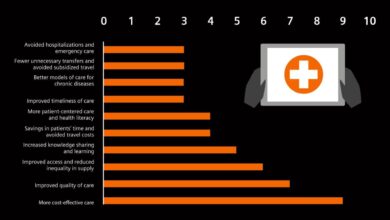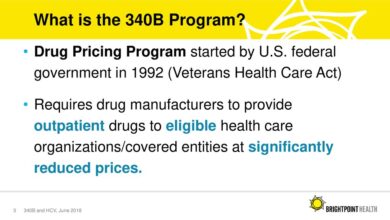
Hospital Capacity Crisis on Horizon
Hospital capacity crisis on horizon: Our healthcare systems are facing a potential catastrophe. Across the nation, hospitals are struggling to keep up with the increasing demand for beds and services, a situation exacerbated by staffing shortages, aging infrastructure, and a growing elderly population. This isn’t just a problem for hospitals; it impacts every single person who might need urgent care.
The ripple effects are already being felt, and unless we take decisive action, the consequences will be devastating.
This looming crisis threatens to overwhelm our healthcare infrastructure, leading to longer wait times, reduced access to critical care, and a potential surge in hospital-acquired infections. We’ll explore the contributing factors, analyze the financial implications, examine potential solutions, and consider the crucial role technology and community preparedness can play in averting disaster. It’s a complex issue with no easy answers, but understanding the challenge is the first step towards finding a solution.
Defining the Crisis
The looming hospital capacity crisis is a multifaceted problem threatening healthcare systems worldwide. It’s not a single event, but a convergence of factors pushing many regions to the brink of overwhelming their ability to provide timely and effective care. This crisis isn’t just about a lack of beds; it’s a complex issue encompassing staffing shortages, resource constraints, and increasing demand for services.
Current State of Hospital Resources
Hospital resources vary drastically across regions. Urban centers in wealthier nations generally have more advanced facilities and higher bed counts per capita than rural areas or developing countries. However, even in well-resourced areas, many hospitals are operating at or near maximum capacity, frequently experiencing extended wait times in emergency rooms and elective procedure backlogs. Rural hospitals, often facing financial difficulties and staffing shortages, are particularly vulnerable, with some already forced to close or reduce services.
This uneven distribution of resources exacerbates the overall crisis, leaving certain populations disproportionately affected.
Factors Contributing to Projected Shortages
Several key factors are driving the projected capacity shortage. The aging population is a major contributor, as older adults tend to require more frequent and complex medical care. Simultaneously, chronic diseases like diabetes and heart disease are on the rise, placing further strain on hospital resources. Furthermore, a persistent shortage of healthcare professionals, including nurses and physicians, limits the ability of hospitals to expand their services even if additional beds were available.
Finally, the increasing cost of healthcare and insurance limitations restrict access for many, leading to delayed care and exacerbating the burden on existing facilities.
Potential Consequences of Insufficient Capacity
Insufficient hospital capacity leads to a cascade of negative consequences. Longer wait times in emergency rooms can delay or prevent timely treatment of life-threatening conditions, leading to increased morbidity and mortality. Delayed elective procedures can worsen chronic conditions and necessitate more intensive interventions later. Overcrowding increases the risk of hospital-acquired infections and compromises the quality of care.
The mental and physical toll on healthcare workers, already strained by high workloads, is substantial and contributes to burnout and staff turnover. Ultimately, insufficient capacity undermines the overall health and well-being of the population.
Comparison with Past Healthcare Challenges
While past healthcare challenges, such as the H1N1 influenza pandemic or the opioid crisis, placed significant strain on healthcare systems, the current projected capacity crisis differs in its sustained and multifaceted nature. Past challenges were often acute, with surges in demand followed by periods of relative stability. The current crisis, however, is characterized by a gradual but relentless erosion of capacity, driven by long-term trends that are not easily addressed through short-term interventions.
This chronic strain on the system poses a more significant and long-lasting threat.
Projected Bed Shortages by Region, Hospital capacity crisis on horizon
The following table provides a hypothetical example of projected bed shortages, illustrating the regional variations in the crisis. It is crucial to note that these figures are illustrative and actual projections vary widely depending on the methodology and assumptions used. Accurate data is difficult to obtain consistently across all regions.
| Region | Projected Shortage | Current Capacity | Percentage Increase in Demand |
|---|---|---|---|
| Northeast | 5,000 | 50,000 | 11% |
| Southeast | 3,000 | 35,000 | 9% |
| Midwest | 2,500 | 40,000 | 6.25% |
| West | 4,000 | 60,000 | 6.67% |
Impact on Patient Care: Hospital Capacity Crisis On Horizon
The looming hospital capacity crisis will undeniably impact patient care in profound and multifaceted ways. Overstretched resources and increased patient volumes will create a ripple effect, affecting everything from access to timely treatment to the overall quality of care received. Understanding these potential impacts is crucial for proactive planning and mitigation strategies.
Increased Patient Wait Times and Reduced Access to Care
Longer wait times in emergency rooms and for elective procedures are an almost inevitable consequence of overflowing hospitals. Patients facing less urgent but still significant health issues might experience delays in receiving necessary diagnoses and treatment, potentially leading to worsened conditions. Access to specialized care will also be compromised as hospitals prioritize the most critical cases, leaving those with less urgent needs to wait longer or even be turned away.
For example, a patient with a suspected heart condition might face a significantly longer wait for a cardiac catheterization, increasing the risk of complications. Similarly, patients needing non-emergency surgeries might experience substantial delays, impacting their quality of life and potentially delaying their recovery.
Increased Risk of Hospital-Acquired Infections
Overcrowding creates an ideal breeding ground for hospital-acquired infections (HAIs). With limited space and increased patient density, the risk of transmission of infectious diseases, such as influenza, respiratory syncytial virus (RSV), and antibiotic-resistant bacteria, dramatically increases. Patients in shared rooms or hallways may be exposed to infections more easily. A shortage of staff and resources further exacerbates the problem, hindering effective infection control practices.
The 2014 Ebola outbreak highlighted the increased risk of infection transmission in overcrowded healthcare facilities, demonstrating the serious consequences of insufficient capacity.
Deterioration in Quality of Care
When hospitals are operating at maximum capacity or beyond, the quality of care inevitably suffers. Overworked and stressed medical staff may experience burnout, leading to errors and reduced attention to detail. Limited resources may force difficult choices regarding the allocation of staff, equipment, and medications, potentially compromising the standard of care provided to individual patients. This can manifest in various ways, from longer wait times for medication administration to less thorough patient assessments and monitoring.
For instance, a hospital facing a staffing shortage might have fewer nurses available to monitor patients, potentially leading to delayed detection of critical changes in a patient’s condition.
Hospital Adaptations to Manage Increased Patient Volume
Hospitals are exploring various strategies to cope with the surge in patients. These include expanding bed capacity through temporary structures or repurposing existing spaces. Some hospitals are investing in telehealth technologies to provide remote consultations and monitoring, reducing the need for in-person visits. Others are streamlining administrative processes and improving patient flow to optimize resource utilization. However, these measures often require significant financial investment and may not be sufficient to fully address the crisis.
For instance, the implementation of telehealth requires investment in technology and training for staff, which can be a considerable expense for already strained hospitals.
Prioritized Impacts of the Hospital Capacity Crisis on Patient Care
- Increased risk of hospital-acquired infections: This poses a direct threat to patient safety and well-being, potentially leading to serious complications and even death.
- Deterioration in the quality of care: Overworked staff and limited resources can compromise the effectiveness and safety of treatment.
- Increased patient wait times and reduced access to care: Delays in diagnosis and treatment can worsen patient conditions and lead to poorer health outcomes.
Financial Implications

Source: revation.com
The looming hospital capacity crisis isn’t just a healthcare problem; it’s a significant financial one, threatening the stability of hospitals, healthcare systems, and insurance companies alike. The increased demand for services, coupled with strained resources, will lead to a cascade of cost increases that will ripple through the entire healthcare ecosystem. Understanding these financial implications is crucial for developing effective mitigation strategies.The escalating costs associated with a capacity crisis are multifaceted and interconnected.
Hospitals face increased expenses across the board, impacting their bottom lines and potentially jeopardizing their ability to provide quality care.
Increased Staffing Costs
Hospitals are already facing a critical shortage of nurses, doctors, and other healthcare professionals. The increased patient load during a capacity crisis will exacerbate this shortage, forcing hospitals to rely more heavily on expensive temporary staffing agencies, overtime pay, and potentially even higher base salaries to attract and retain qualified personnel. For example, a hospital system in a major metropolitan area might see a 20% increase in its nursing budget due to increased overtime and agency staffing costs alone, representing millions of dollars in additional expenditure.
This pressure on staffing budgets is further compounded by the need for additional training and specialized certifications to handle the surge in patients with complex needs.
Equipment and Supply Costs
The demand for medical equipment and supplies will inevitably surge during a capacity crisis. Hospitals may need to purchase additional ventilators, monitors, beds, and other critical equipment to meet the increased patient volume. Furthermore, the consumption of disposable supplies like gloves, gowns, and medications will increase significantly. Consider a scenario where a regional hospital needs to acquire 20 additional ventilators at an average cost of $50,000 each; this represents a $1 million immediate capital expenditure, not including the cost of maintenance and replacement parts.
Similarly, the increased use of disposable supplies can easily add hundreds of thousands of dollars to the monthly operating budget.
Impact on Insurance Companies and Healthcare Payers
The increased costs incurred by hospitals will inevitably be passed on to insurance companies and other healthcare payers. Higher hospital bills will lead to increased insurance premiums for individuals and employers. Government healthcare programs like Medicare and Medicaid will also face increased financial strain, potentially leading to budget cuts in other areas of healthcare. The financial burden will not be evenly distributed, with some payers facing disproportionately higher costs depending on their contract negotiations and risk pools.
For instance, a significant increase in hospital readmissions due to inadequate initial care during a capacity crisis could lead to increased costs for insurers covering those patients.
Cost Implications of Mitigation Strategies
Various mitigation strategies exist to address the capacity crisis, each carrying its own cost implications. Investing in new hospital infrastructure, expanding existing facilities, and improving telehealth capabilities are all expensive propositions. However, the long-term cost savings from preventing a crisis may outweigh the initial investment. For example, investing in advanced telehealth systems could reduce the need for hospital admissions for certain conditions, thus offsetting some of the costs associated with increased patient volume.
Conversely, delaying investments might result in even greater financial strain due to increased emergency room visits, longer hospital stays, and higher mortality rates.
Hypothetical Budget Showing Potential Cost Increases
| Category | Current Annual Budget | Projected Increase (%) | Projected Annual Budget Increase |
|---|---|---|---|
| Staffing (Nursing) | $50,000,000 | 20% | $10,000,000 |
| Staffing (Physicians) | $30,000,000 | 15% | $4,500,000 |
| Equipment & Supplies | $10,000,000 | 30% | $3,000,000 |
| Overtime & Agency Staffing | $5,000,000 | 50% | $2,500,000 |
| $20,000,000 |
This hypothetical budget illustrates the potential magnitude of cost increases facing a large hospital system during a capacity crisis. The actual figures will vary depending on the specific circumstances and the chosen mitigation strategies. However, the example highlights the substantial financial burden that hospitals and healthcare systems will face.
Policy and Solutions
The looming hospital capacity crisis demands immediate and multifaceted policy interventions. Addressing this challenge requires a coordinated effort involving government action, private sector collaboration, and innovative approaches to resource allocation and efficiency. Failure to act decisively will result in further deterioration of patient care and escalating healthcare costs.
Government Funding and Regulation
Increased government funding is crucial to alleviate the capacity crisis. This funding should be strategically allocated to support hospital infrastructure improvements, expansion of healthcare workforce training programs, and the adoption of advanced technologies that enhance efficiency. Furthermore, robust regulation is needed to ensure that funding is used effectively and transparently, preventing waste and promoting accountability. For example, a government initiative could mandate a minimum staffing ratio in hospitals, coupled with funding to recruit and train additional nurses and doctors.
This would directly address the staffing shortages contributing to capacity issues, while also improving patient care quality. Additionally, regulations could incentivize the development of more efficient hospital models and penalize institutions that fail to meet minimum quality and capacity standards.
Public-Private Partnerships
Public-private partnerships (PPPs) offer a viable mechanism to expand hospital capacity and improve access to care. PPPs leverage the expertise and resources of both the public and private sectors, leading to innovative solutions and shared risk. For example, a PPP could involve a private company constructing and managing a new hospital wing, with the government providing land and ensuring access for patients covered by public health insurance.
Successful PPPs require clearly defined roles and responsibilities, transparent agreements, and effective monitoring mechanisms to ensure accountability and prevent conflicts of interest. The success of such partnerships hinges on a well-structured agreement that balances the interests of both parties while prioritizing patient well-being.
Models for Improving Hospital Efficiency and Resource Allocation
Several models can enhance hospital efficiency and resource allocation. These include implementing electronic health records (EHRs) to streamline administrative processes and improve care coordination; adopting lean management principles to eliminate waste and improve workflow; and utilizing predictive analytics to optimize staffing levels and resource deployment. For instance, a hospital employing lean management might analyze patient flow to identify bottlenecks in the emergency department, leading to process improvements that reduce wait times and improve patient throughput.
Similarly, predictive analytics could forecast surges in patient volume based on historical data and seasonal trends, allowing hospitals to proactively adjust staffing levels and resource allocation to avoid overcrowding. The adoption of these models often requires significant upfront investment, but the long-term benefits in terms of improved efficiency and cost savings are substantial.
Implementing a Proposed Solution: A Flowchart
The following flowchart illustrates the steps involved in implementing a proposed solution focusing on increased hospital bed capacity through a public-private partnership:[Imagine a flowchart here. The flowchart would visually represent the following steps:
1. Needs Assessment
Identify capacity shortfall and specific needs.
With a looming hospital capacity crisis on the horizon, access to specialized care is becoming increasingly challenging. This is especially true for conditions requiring ongoing management, like Tourette Syndrome, where consistent support is crucial. For parents seeking effective strategies, I highly recommend checking out this helpful resource on strategies to manage Tourette syndrome in children.
The strain on our healthcare system means early intervention and effective management plans are more critical than ever before.
2. Partnership Formation
Establish a public-private partnership agreement.
3. Funding Acquisition
Secure funding from government and private sources.
4. Planning and Design
Develop plans for new facilities or renovations.
5. Construction/Renovation
Build or renovate hospital facilities.
6. Staffing and Training
Recruit and train additional healthcare professionals.
7. Technology Implementation
Integrate EHRs and other advanced technologies.
8. Operation and Monitoring
Monitor performance and make adjustments as needed.
9. Evaluation and Reporting
Assess the impact of the intervention and report findings.]
Technological Solutions

Source: wcnc.com
The looming hospital capacity crisis demands innovative solutions, and technology offers a powerful arsenal to combat this challenge. By strategically implementing various technological advancements, we can significantly improve efficiency, optimize resource allocation, and ultimately alleviate the strain on our healthcare systems. This involves leveraging telehealth, AI-driven systems, and robust data analytics to create a more responsive and resilient healthcare landscape.
Telehealth and Remote Patient Monitoring
Telehealth and remote patient monitoring (RPM) are transforming healthcare delivery by extending care beyond the hospital walls. Telehealth platforms facilitate virtual consultations, allowing physicians to assess patients remotely, reducing the need for in-person visits for non-urgent conditions. RPM systems, using wearable sensors and connected devices, continuously monitor vital signs and other health metrics, enabling early detection of potential problems and timely interventions.
This proactive approach minimizes hospital readmissions and reduces the burden on emergency departments. For example, a patient with chronic heart failure can have their heart rate and blood pressure monitored remotely, alerting healthcare providers to any concerning changes before they escalate into a hospital-worthy emergency. This prevents unnecessary hospital admissions and frees up valuable bed space.
AI and Machine Learning in Hospital Workflow Optimization
Artificial intelligence (AI) and machine learning (ML) offer the potential to streamline hospital workflows and improve operational efficiency. AI algorithms can predict patient flow, optimize staffing levels, and manage resources more effectively. ML models can analyze large datasets of patient information to identify patterns and predict potential risks, allowing for proactive interventions. For instance, AI can analyze patient data to predict which patients are at high risk of developing complications post-surgery, enabling proactive measures to prevent those complications and potentially reducing hospital stays.
This translates to better resource allocation and reduced pressure on hospital beds.
Data Analytics in Predicting and Managing Hospital Capacity
Data analytics plays a crucial role in predicting and managing hospital capacity. By analyzing historical data on patient admissions, length of stay, and resource utilization, healthcare providers can develop predictive models to forecast future demand. This allows for proactive planning and resource allocation, preventing capacity shortages and ensuring that resources are available when and where they are needed most. For example, analyzing historical data from flu seasons can allow hospitals to predict the peak demand for beds and staff, enabling them to implement contingency plans such as increasing staffing levels or activating surge capacity.
Successful Technology Implementations in Healthcare
Several healthcare systems have successfully implemented technological solutions to improve efficiency and manage capacity. The Mayo Clinic, for example, has extensively used telehealth to expand access to care and reduce hospital visits. Other hospitals have implemented AI-powered systems to optimize scheduling and resource allocation, leading to significant improvements in efficiency. These successful implementations demonstrate the potential of technology to address the challenges of hospital capacity.
Impact of a Specific Technological Solution on Hospital Bed Utilization
Let’s consider the impact of a predictive modeling system using AI and machine learning on hospital bed utilization. Imagine a hospital with an average daily occupancy of 80%. By implementing a system that accurately predicts which patients are likely to require admission within the next 24 hours, the hospital can proactively manage its bed allocation. Let’s assume the system accurately predicts 10% of admissions 24 hours in advance.
This allows the hospital to prepare beds, schedule staff, and potentially even manage patient flow to avoid overcrowding. In a hospital with 200 beds, this means 20 beds can be prepared proactively. This reduces the likelihood of patients being placed in hallways or other less-than-ideal locations, improving patient care and overall hospital efficiency. A visual representation would show a bar graph comparing bed occupancy before and after implementation of the predictive system.
The “before” bar would show a higher, more fluctuating occupancy rate near capacity, while the “after” bar would show a lower, more stable occupancy rate with fewer peaks, illustrating a smoother and more efficient use of available beds. This improved management reduces the need for overflow beds or temporary solutions and ultimately contributes to better patient outcomes and reduced strain on the system.
Community Preparedness
A looming hospital capacity crisis necessitates a robust community-based response. We must move beyond reactive measures and build a proactive system that leverages existing resources and fosters collaboration to ensure the health and well-being of our communities, even under immense pressure. This requires a multi-pronged approach encompassing the vital roles of community health centers, public education, and community engagement, all while considering the potential expansion of home healthcare services.
The Role of Community Health Centers in Mitigating the Crisis
Community health centers (CHCs) are strategically positioned to play a critical role in mitigating a hospital capacity crisis. Their established networks within underserved communities, combined with their focus on preventative care and primary care services, offer a crucial buffer against overwhelming hospital emergency rooms. CHCs can expand their capacity to handle non-emergency cases, freeing up hospital beds for those with critical needs.
They can also play a vital role in managing chronic conditions, preventing hospital readmissions, and providing timely vaccinations and screenings, reducing the overall burden on hospital systems. For instance, during the COVID-19 pandemic, many CHCs effectively administered vaccines and provided testing services, preventing a surge in hospitalizations.
Strategies for Educating the Public About Preventative Care
Effective public health education is paramount in reducing the strain on hospital resources. This requires a multifaceted approach utilizing various communication channels. Targeted campaigns emphasizing preventative measures such as vaccinations, healthy lifestyle choices (diet, exercise), and early detection of diseases through regular screenings can significantly reduce the number of preventable hospitalizations. For example, public service announcements featuring relatable stories of individuals who benefited from preventative care, coupled with easily accessible online resources and community workshops, can significantly improve public awareness and engagement.
The use of social media and local media outlets is also critical to reaching diverse populations effectively.
With a hospital capacity crisis on the horizon, news like Steward Health Care securing financing to avoid bankruptcy steward health care secures financing bankruptcy is both a relief and a warning sign. It highlights the precarious financial state of many healthcare systems, potentially exacerbating the looming bed shortage and impacting patient access to care. We need to address these systemic issues before the crisis fully unfolds.
The Importance of Community Engagement and Collaboration
Addressing a hospital capacity crisis demands strong community engagement and collaboration. This involves bringing together diverse stakeholders—healthcare providers, local government officials, community leaders, and residents—to develop and implement comprehensive preparedness plans. Open communication and coordinated efforts are essential to ensure that resources are allocated efficiently and that the community’s needs are met. For example, establishing a community-based task force that meets regularly to discuss emerging challenges and coordinate responses is a vital step.
With a hospital capacity crisis on the horizon, it’s more crucial than ever to understand conditions that strain our healthcare systems. One such condition is stroke, and understanding the risk factors that make stroke more dangerous is vital for preventative care and efficient resource allocation. This means focusing on early detection and prevention to minimize the strain on already stretched hospital resources during this impending crisis.
This collaborative approach can foster a sense of shared responsibility and empower community members to play an active role in ensuring the resilience of the healthcare system.
Increased Reliance on Home Healthcare Services
As hospital capacity shrinks, the demand for home healthcare services will inevitably increase. Expanding access to home healthcare, including telehealth, can effectively manage many conditions outside of a hospital setting. This reduces the burden on hospitals while allowing patients to recover in the comfort of their homes. For example, post-surgical care, chronic disease management, and palliative care can all be successfully delivered in the home setting with appropriate support and technology.
Investing in home healthcare infrastructure, including training more home healthcare professionals and providing telehealth technology, is crucial to ensure the successful implementation of this strategy.
A Plan for Community-Based Preparedness
A comprehensive community-based preparedness plan requires clear roles and responsibilities. This plan should Artikel key actions, including:
- Early Warning System: Establish a system to monitor hospital bed occupancy rates and other key indicators to predict potential crises.
- Resource Allocation: Develop a plan for allocating resources, such as personnel and equipment, in the event of a capacity crisis.
- Communication Strategy: Create a clear communication plan to keep the public informed and to coordinate responses among healthcare providers and community organizations.
- Surge Capacity Planning: Identify potential surge capacity locations, such as community centers or schools, that can be used to accommodate overflow patients.
- Public Education Campaign: Launch a public awareness campaign promoting preventative care and responsible healthcare utilization.
This plan should be regularly reviewed and updated to ensure its effectiveness in responding to evolving challenges. Regular drills and simulations can help test the plan’s effectiveness and identify areas for improvement. Collaboration with regional and state-level agencies is essential for coordinating responses across broader geographical areas.
Final Wrap-Up
The impending hospital capacity crisis demands immediate and comprehensive action. While the challenges are significant, a multi-pronged approach involving policy changes, technological advancements, improved community preparedness, and a renewed focus on preventative care offers a path forward. Ignoring this looming crisis is not an option; the well-being of our communities depends on our collective ability to address this critical issue before it’s too late.
The time for proactive solutions is now; let’s work together to build a more resilient and responsive healthcare system.
Key Questions Answered
What are the biggest contributing factors to the hospital bed shortage?
A combination of factors contributes, including an aging population requiring more care, increasing chronic disease rates, insufficient healthcare workforce, and inadequate hospital infrastructure.
How will this affect patients who don’t need emergency care?
Increased wait times for elective procedures and routine appointments are likely, potentially delaying necessary treatments and impacting overall health outcomes.
What role can preventative care play in mitigating this crisis?
Investing in preventative care, such as vaccinations and health screenings, can reduce the number of hospitalizations for preventable conditions, easing the strain on hospital capacity.
Are there any successful examples of technology improving hospital efficiency?
Yes, many hospitals are using telehealth, AI-powered diagnostic tools, and predictive analytics to optimize resource allocation and improve patient flow, reducing wait times and bed occupancy.





